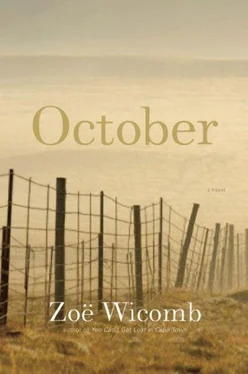Thus it was that Oom Hansie presented her with a chest, a wooden box made of slats in which he said she could keep her private things. Sylvie held out her hand formally to say thank you, then let out a whoop of delight. Yislaaik, she crowed, but she would have to find a pretty cover so that no one could peep through the slats.
The next day Oom Hansie brought a small Bokomo flour bag and showed her that if one unpicked the stitching on the sides it turned into a single length of cloth. If you washed it, he said, you could embroider in nice colors all around the faded images of corn on both sides. Green for the stalks, yellow for the cobs, which he warned would take some nifty needlework to pick out the individual kernels, and then any color you fancy for the surround, although it might not be desirable to draw attention to the cloth’s origin by embroidering the words, BOKOMO.
Sylvie thought otherwise. She did not mind this handwork. It took a while to do the yellow corn, as well as a crocheted edging for the whole cloth in red. But the large letters of BOKOMO were easier, picked out in bright turquoise. Draped over the rough chest, the words became a special reminder of Oom Hansie. What did she care that AntieMa thought it common or backward to have a flour sack as a drape? As long as she kept her nose out of Sylvie’s chest.
What do you keep in there? the old woman asked. It was a secret. She wouldn’t say that all there was was a pale blue bird’s egg and her Standard Three Reader with the story about a girl’s red shoes that she had not returned to school. And a handful of boklam’s perfect drolletjies.
Mist in the shallow valley crept up slowly like a thief across the field, toward the motorway. If you looked, it stopped in its tracks, guiltily. Like a game they played as children, What’s the time, Mr. Wolf. Which, of course, was no good with only two of them.
Why was Mercia on a bus rather than on the train to Edinburgh? Ever conscientious, she worked at it, the being-left-behind, the management of loss and grief. Everything was different, and to maintain control, to keep on top of things, difference itself had to be cultivated. So why not the bus, why not see for herself why people of her kind preferred the train?
Now was the time, she said to Smithy, to assess all her habits, to check whether there was room for change. Craig’s defection, his loss of interest in her, may well have happened because of her unexamined habits. A loved one may once have turned a blind eye, but in time would come to raise an eyebrow at slovenliness, at the old slippers and shabby dressing gown she clutched around her on a Sunday morning until well into the day.
Smithy threw back her head in laughter. He didn’t leave because of your dressing gown, though he should have done. High time that went into the bin, so why don’t you come shopping instead, but Mercia thought herself above retail therapy. Smithy was patient. She listened over and over to the same story, the same arguments. And the same question: was the old Craig for whom betrayal was unthinkable the same person as the Craig who had betrayed Mercia?
Heavens, Smithy, replied, who would have thought that you’d use the language of pulp fiction? It’s not a question of betrayal, nothing to do with subjectivity; it’s just what happens when your affections shift to someone else. Then Mercia would say triumphantly, so when women grow old and fat and ugly it’s fine for men, themselves grown old and fat and ugly, to put aside notions of commitment and fidelity?
Neither of you is fat and old and ugly, but it appears to be what some men do. Who knows to what extent Mother Nature herself is responsible? Why, for instance, do men and women have such different libidos? When women are well past such things, men are still driven. . Smithy was careful not to speak of reproduction.
Well, your Ewan wouldn’t run off, would he?
They both laughed at the phrase, at the idea of Ewan running anywhere.
There’s no knowing what an accident of time and place might bring. Someone may well one day step in his path and like what she sees just as he looks up at her in wonder, both smitten by the new. Then that will be it, the very Ewan who doesn’t run.
How romantic, and how well prepared you are, Mercia snapped.
Mercia knew that there was no solution to such talk. Commitment and fidelity were themselves contingencies, but there was some comfort in raking over those embers, in trusting that they would one day according to the law of nature burn themselves out, collapse into ashes. Only a month ago she would not have thought in terms of ashes, so there was something to be said for the old, tired metaphors.
Jerking its way out of a narrow road, the bus jolted her out of the obsessive thoughts. Mercia had imagined that it would belt niftily along the motorway, had no idea that it would first bump through suburbs on the edge of the city, making her stomach heave as it then made up for lost time on the motorway. Oh, she had not been looking and now the mist has crept up, engulfing them.
Mercia started at the sound from the seat behind her. Hers was not the only heaving stomach. She had been aware of the little boy’s voice, the chatter of one who has learned to make meaningful sounds and now was afraid of pausing, so that the words were a constant stream linked with because. . because. . because, used as a filler and in answer to his own questions. The young mother interjected with a soothing voice, reassuring him about the animals awaiting them in the zoo, the growling wra-wra of the lion; the hiss-ss of snakes. Christ, that was why people preferred the train. Mercia had not known that the bus went via the zoo. No wonder it was full of babbling children and mothers with flexible vocal cords, up and down the scales of infantile wonder and pious motherhood, backed by the rustle of snacks from backpacks.
Behind her there was the unmistakable sound of boaking, so that she jerked forward to avoid projectile vomit. The child cried, a slow gathering of sobs as he lamented the mess he had made, a mess that spread over the seat, over his mummy, over the animals in their lairs, over the entire day. He was sorry, he wailed; it was all messy, he wailed.
The woman’s voice wormed and slithered soothingly. It was only sick, she said, only the crisps and juice come back up because the bus was bumping his tummy, and as for the mess, no matter at all, Mummy would clear it all up. How lucky they were that in the backpack there was a spare pair of trousers, and look, a whole packet of wet-wipes with which to mop up the sick. A plastic bag for the dirty tissues, ran her commentary, as she cleaned up. But the child, implacable, and evidently a cleanliness freak, would not be consoled; he had ruined everything.
Sweetheart, my sweetheart, the woman soothed, there is nothing in the world to worry about. Mummy will sort it all out. A little boy can’t help being sick, the greedy lion cubs too have been sick, and that’s because like the hungry caterpillar they’ve eaten too much — one piece of chocolate cake, one ice cream cone, one pickle, and he recited along between sobs: one cherry pie, one sausage, until the voice became inaudible as his face, Mercia imagined, was squashed into the woman’s bosom.
Sweetheart, my sweetheart, sang the maternal voice, everything’s fine. Shall we try to find the gruffalo at the zoo? Silly Mummy, hey? Doesn’t she know. .
There’s no such th-thing, he sniffed and gasped, as the gruff-gruff-gruffalo.
Christ, Mercia’d had enough. She thought about changing seats. Then her own stomach heaved as she lurched into the past, once more a child groping for her mother’s skirt, sobbing her sorrys and her incomprehension. She did not mean to drop a cup onto the cement floor. Why would she be beaten for an accident? How could anyone imagine that she wanted to see it in shards? She too loved the cool white of the glaze, the pretty pink posy on the rim. But there was no such thing as an accident, said Nettie. There was only carelessness, a disregard for her parents’ hard work and sacrifice, which in itself was an offense before God, and which the child knew to be the case. The beating then stood for a lesson in care and vigilance.
Читать дальше












